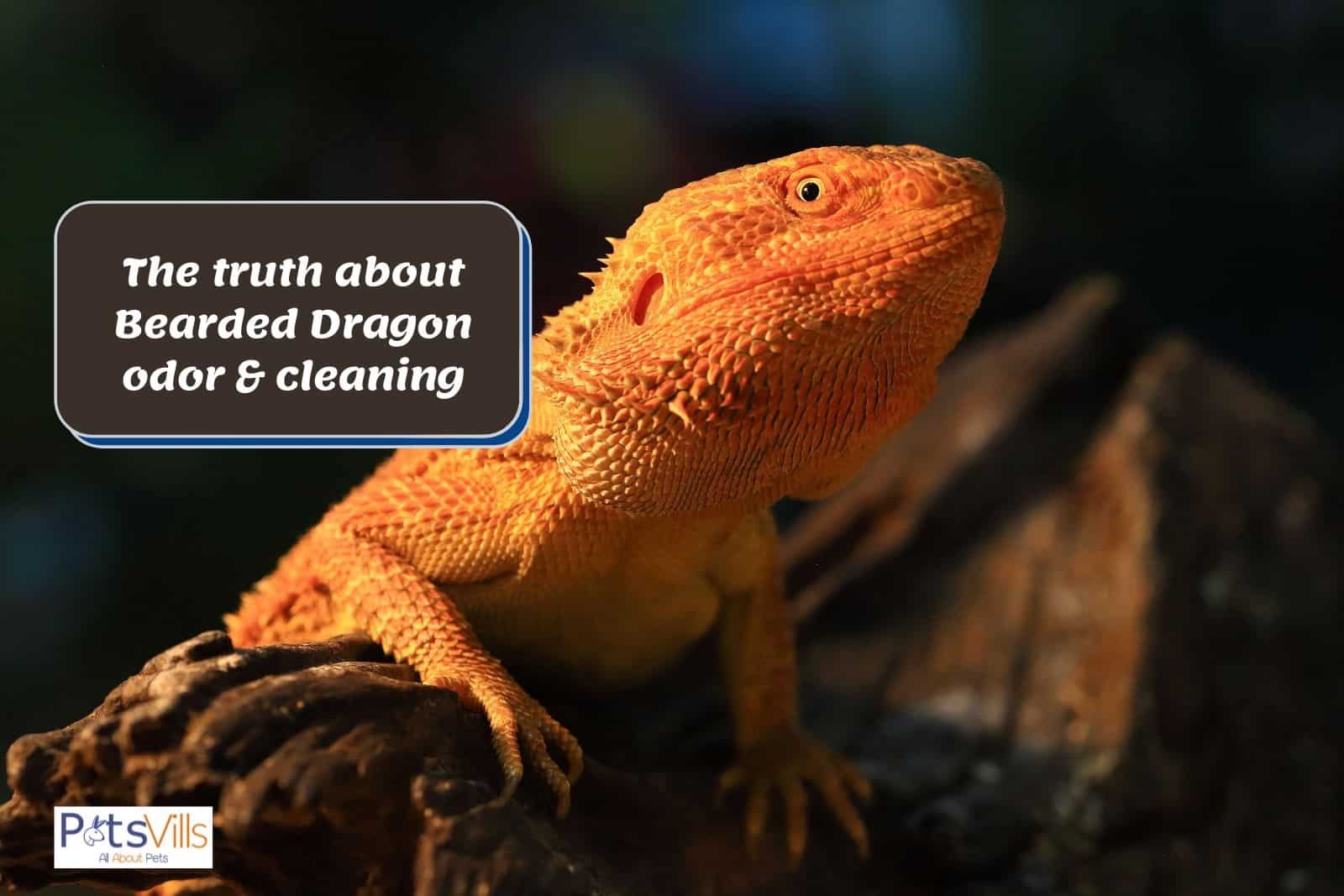I’m interested in adopting one, but… do bearded dragons stink? Is bearded dragon odor that bad?” – A future beardie owner.
I have to admit; I also asked this numerous times before purchasing my beardie. And to my surprise, it wasn’t that bad after all! In fact, it was the other way around!
If that is so, why are there tons of tutorials and guides online about keeping a beardie odorless?
Check: How Long Can Bearded Dragons Be Out of Their Cage?
Table of Contents
Do Bearded Dragons Stink? [Truth Uncovered]
Truth be told –by nature, bearded dragons have a neutral smell; it’s as if they don’t have one!
Here’s a video confirming that the tanks are smelly, as well as tips on how you can clean them:
But why do a lot of beardie owners look for ways to make their beardies smell better? Two words –dragon poop. Yes, you read that right – bearded dragon poop.
Akin to any other creature, our beardies secrete waste, and of course, waste isn’t pleasant. Other than dragon poop, though, a few factors can contribute to the bad smells.
I present to you the primary culprits of the foul odor you smell from your bearded dragon enclosures.
Culprit 1: Bearded Dragon Poop and Urine
A bearded dragon poop smell is the number one factor that makes the smell. Like human feces, dog feces, or any other type of feces, bearded dragon poop is the same.
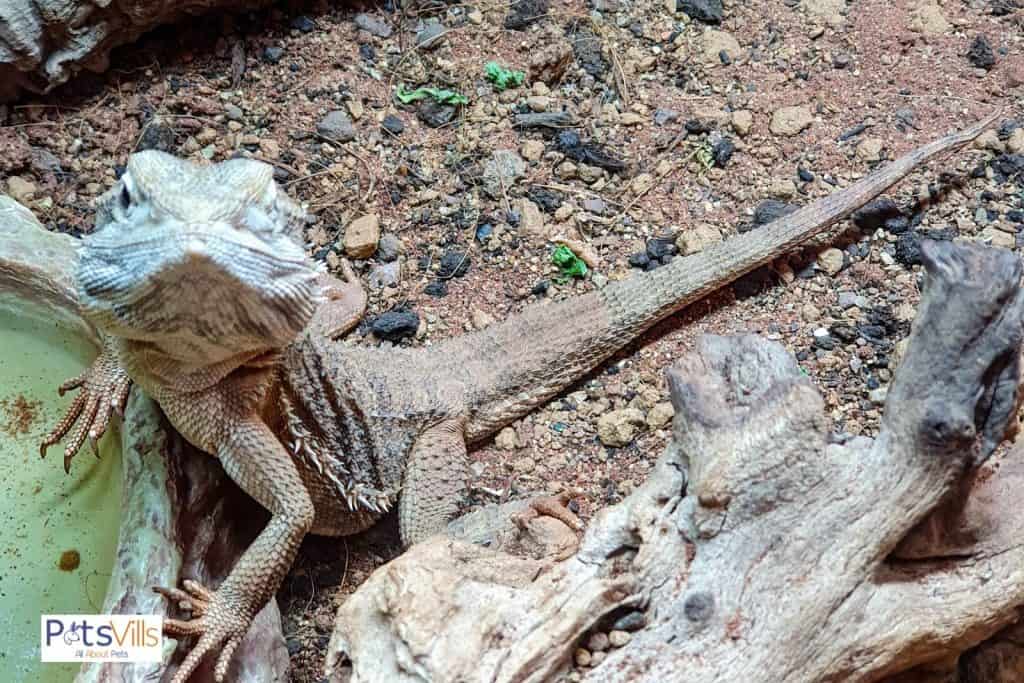
The solution is easy, but a lot of bearded dragon owners disregard this.
Many let the poop stay inside for days without even considering cleaning it!
Don’t be like that owner; let your reptile friend enjoy its time inside the tank and clean their poop when they’re done for the day.
Not only does it smell bad, but it also invites parasites, bacteria, and all other negative factors that could endanger your beardie’s health.
NOTE: Beardies poop one (1) to two (2) times per day, depending on their consumption. Study this schedule and clean it when you’re sure they’re done with business.
Culprit 2: Dead Wild Insects (Feeder Insects)
Other than poop, insects also smell bad, especially if they’re left dead at a particular spot. I reside where wild insects are rampant, so they usually always spend time inside the tank.
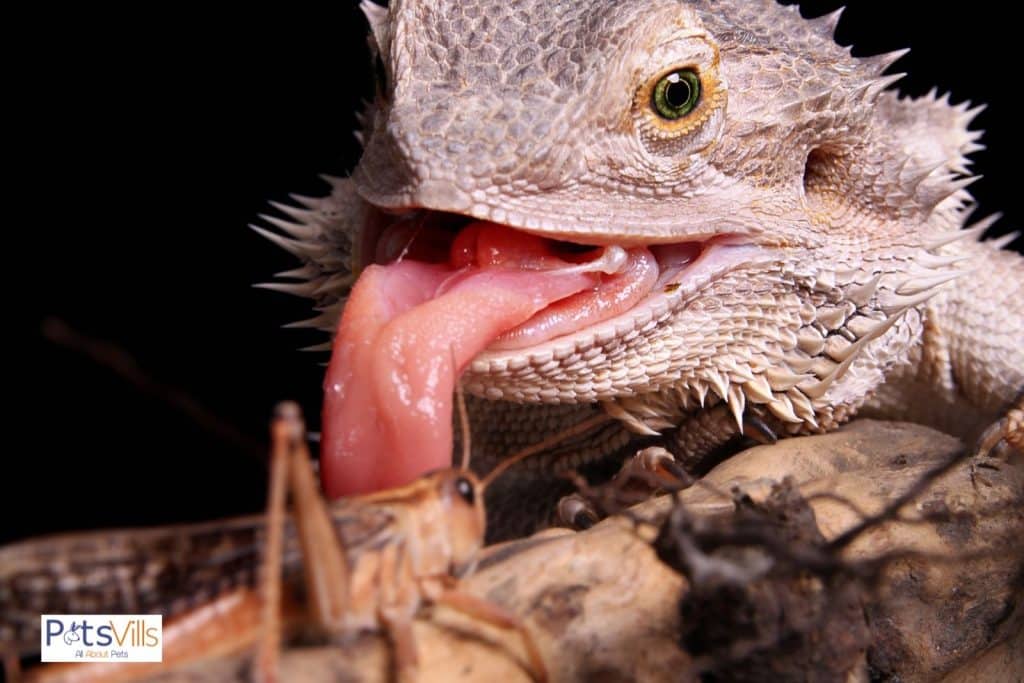
Feeder insects or the usual wild insects that you feed your beardie can be another factor, too.
FUN FACT: Crickets secrete waste [1] that has foul odors you will NEVER like. Avoid using crickets as your feeder insects.
So, do regular spot cleaning on your tank to avoid the accumulation of live and dead insects inside.
Culprit 3: Dirty Substrate
The substrate or the reptile carpet of your enclosure gets dirty just like how our floors do.
For loose substrates, make sure to replace them at least once (1) every month.
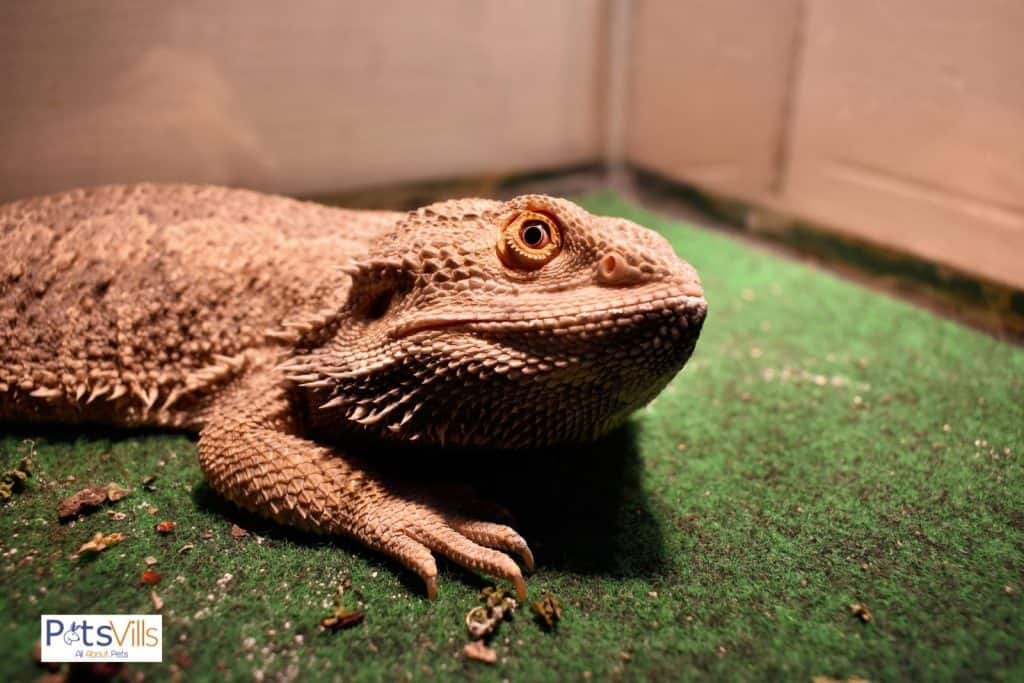
Regardless of the type of substrate you’re using, it can smell if not cleaned
For solid substrates, on the other hand, clean and maintain it at least once (1) every two (2) months. If the smell is retained even after you clean it, replace it.
NOTE: When you clean and replace the dirty substrate, clean the whole tank. Leaving the sides and the top part of the tank dirty might not be effective in removing the odor.
Culprit 4: Rotten/Contaminated Food (Uneaten Food)
Any food that’s left oxygenated can rot and contaminate [2]. Ensure that you take your beardie’s greens or vegetables out when they’re not eaten.
Please refrain from leaving them in the tank for more than six (6) hours when they’re left uneaten.
My rule of thumb is to take out the vegetables when I notice that my beardie doesn’t like it.
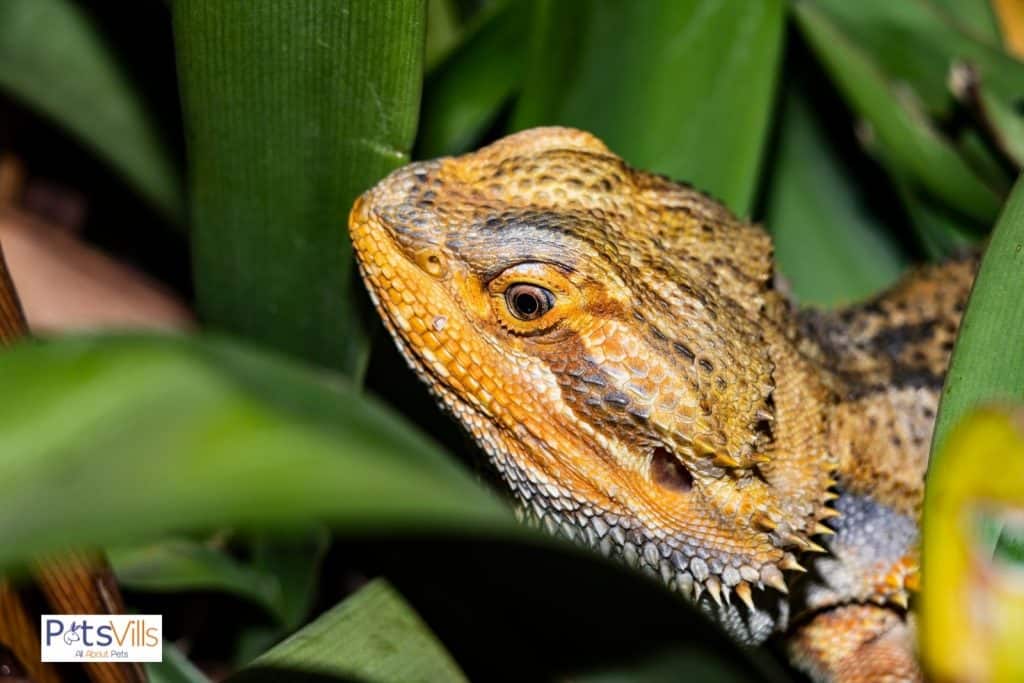
So, I take it out and replace it with other greens.
NOTE: If the temperature inside the tank is high and humid, the vegetables will dry out and rot faster. Eventually, it will decay. Take it out before it decays because it will emit foul odors.
Culprit 5: Moisture and High Humidity
Last but most definitely not least is moisture. Yes, your beardie needs moisture for it to live, but that doesn’t mean that you need tons of it!
Extremely high humidity levels can cause mildew or mold [3], creating a foul odor. Keep the adult bearded dragon tank moderately warm but not too humid.
I use an under-tank control (UTC) heater for it but in regular intervals, depending on the mood of my beardie. If my beardie could talk, it’ll thank me and give me a high five for doing a good job!
EXPERT TIP: Only turn the UVB light source or the heat lamp on during basking time. They don’t always like to raise their body temperatures, plus it can increase the entire cage’s humidity!
Now that you know these five (5) factors avoiding them to avoid the foul odors will be a walk in the park! You won’t be running around asking if they’re smelly because they’re not!
Check: All Bearded Dragon Essentials You Need to Have!
Why Does My Bearded Dragon Stink?
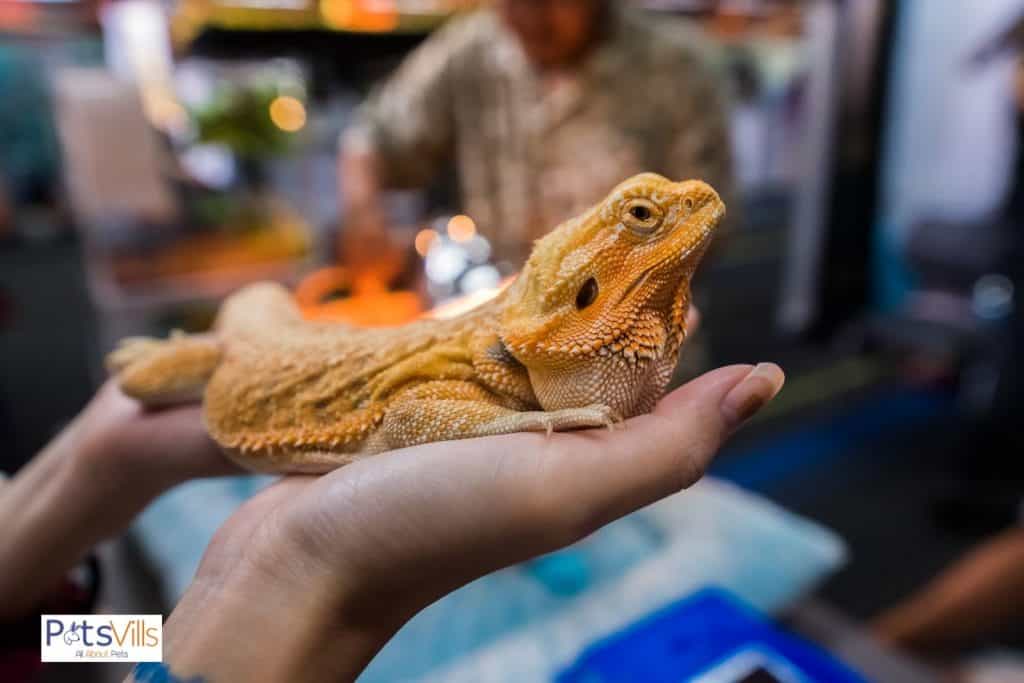
I know it can all be confusing. But the bad smells that you’re sensing could be coming from the bearded dragon cage, not from your beardie.
The smell could be from waste or dragon poop, or urine you missed to take out during cleaning time.
Unless your beardie is smothered with its waste, uneaten food for days, and other organic materials, you should not be smelling anything bad.
How Do You Clean a Smelly Bearded Dragon?
Our pet reptiles love playing on the ground/substrate. It’s almost inevitable that they wouldn’t be covered in their feces.
But if the odor is coming from the tank, you’ll have to ensure that you clean it right away.
So, how do you get rid of the bad bearded dragon smell? Here are a few things to note to ensure that your beardie stays fresh and fragrant.
1. Perform Daily Spot Cleaning
Make it a habit of performing daily spot cleaning:
- Taking dragon poop and urine out and cleaning the location of where it was.
- Cleaning the food and water bowls daily and replenishing them.
- Checking and cleaning your beardie for glued waste/dirt on its body.
- Removing stains/dirt/stuck-up dirt on the enclosure’s side panels.
2. Practice Overall Tank Cleaning Monthly
Clean your dragon cage monthly. The deep cleaning I’m talking about includes checking the substrate, cleaning all the accessories inside the tank, disinfecting the tank, etc.
I usually do the cleaning at an interval of a month and a half. But, of course, I spot clean my tank once (1) every four (4) to six (6) hours.
Call me OC, but I like to keep my beardie’s enclosure spot-free!
3. Use Non-Toxic Odor Neutralizers
Lastly, consider using odor neutralizers. Many people inquired if they could use scented candles, air fresheners, and other artificial fresheners, and no, it’s not for the best.
While it’s safe and mild for us humans, it’s detrimentally toxic to our pets; it can even make your dragon sick.
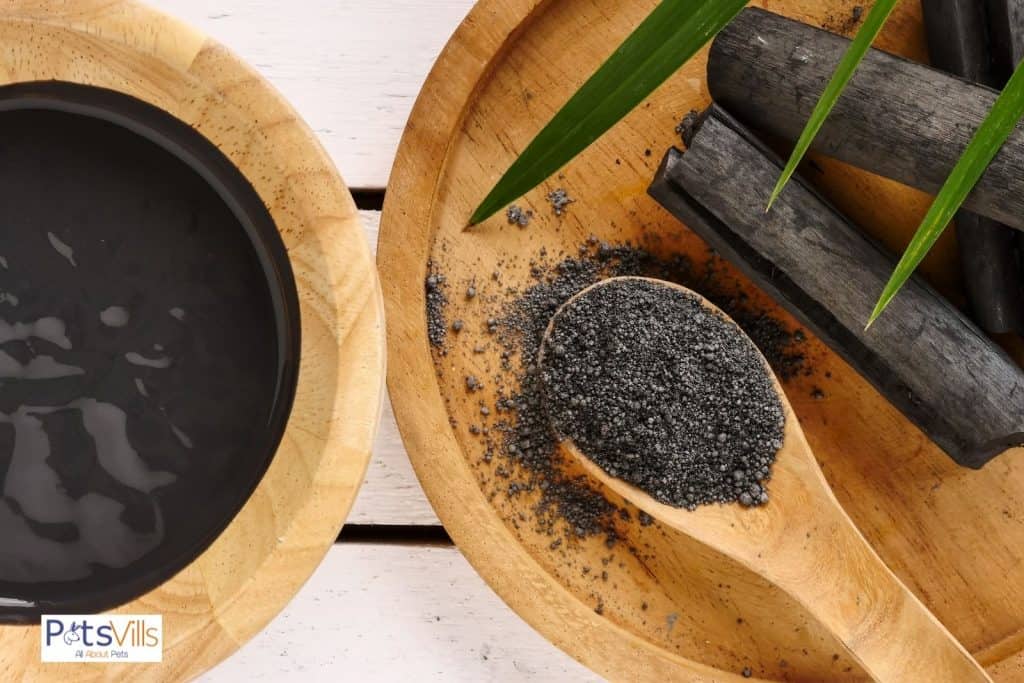
The best thing to use can be activated charcoal [4], household ammonia, and plants.
I use mint plants combined with bamboo-activated charcoal, and it works like magic!
FAQs
Some of you might still be wondering about a few points and factors.
Well, don’t worry! I’ve gathered the most thrown questions about this for you!
Why Does My Bearded Dragon Smell Like Fish?
The fish smell is most likely emitted by the tank/enclosure, not by the beardie. It could be a buildup of germs, fungi, and other bacteria.
Does Bearded Dragon Poop Smell?
Yes, because it is coming from what they eat! If you feed them their regulars of feeder insects, leafy green vegetables, and other sources of protein, it will stink!
How Can I Make My Beardie Smell Better?
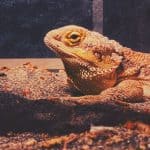
To make your beardie smell better, give it a warm bath at least once (1) a week.
You can bathe your beardie by filling up a container with warm water that is leveled to their necks when they’re looking up.
Let your beardie soak for up to 20 minutes and dry it out using a clean towel.
In Conclusion
The next time you wonder why your bearded dragon smells, you have this tutorial about their odor to see if it’s really your beardie or if it’s the habitat.
Resources
- 1. Lane AL. Cricket Stink: The Troubles of Being a Cricket Farmer [Internet]. Medium. 2017 [cited 2022 Jan 5]. Available from: https://medium.com/@alexllane/cricket-stink-the-troubles-of-being-a-cricket-farmer-335100281996
- 2. Prevention of post-harvest food losses fruits, vegetables and root crops a training manual – Pre-harvest factors in produce marketing-Perishability and produce losses-cont. [Internet]. www.fao.org. Available from: https://www.fao.org/3/t0073e/t0073e02.htm
- 3. Dunkin MA. Moisture and Mold Problems: Preventing and Solving Them in Your Home [Internet]. WebMD. 2021. Available from: https://www.webmd.com/lung/mold-mildew
- 4. Srinivas C, Mathew A, Chakravarthi A. Activated charcoal and baking soda to reduce odor associated with extensive blistering disorders. Indian Journal of Dermatology, Venereology and Leprology. 2008;74:122.
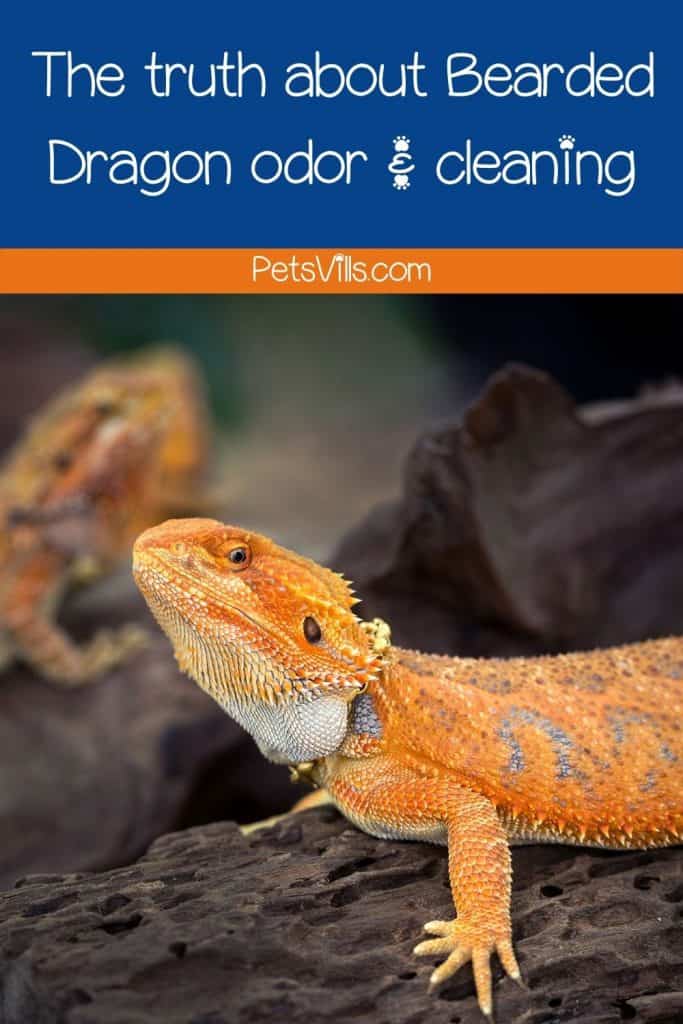
What are your thoughts about bearded dragon odor? Let us know in the comments below!
Alina Hartley is a small-town girl with a ginormous love of bearded dragons. It all started with Winchester, a baby bearded who was abandoned at the shelter by his former owners because of a birth defect that caused one front leg to be shorter than the other. Alina originally went to the shelter looking for a guinea pig, but one look at Winchester and it was love at first sight. From that day on, Alina has dedicated her life to learning everything she can about bearded dragons. She loves helping new beardie parents start their incredible journey with these magnificent reptiles.
Follow her on:
LINKEDIN
TWITTER.
Read her latest articles HERE
Learn more about her HERE.

